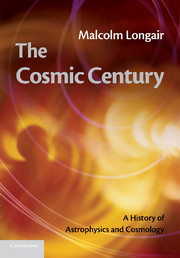Book contents
- Frontmatter
- Contents
- Preface
- Acknowledgements
- Part I Stars and stellar evolution up to the Second World War
- Part II The large-scale structure of the Universe, 1900–1939
- Part III The opening up of the electromagnetic spectrum
- Part IV The astrophysics of stars and galaxies since 1945
- Part V Astrophysical cosmology since 1945
- 12 Astrophysical cosmology
- 13 The determination of cosmological parameters
- 14 The evolution of galaxies and active galaxies with cosmic epoch
- 15 The origin of galaxies and the large-scale structure of the Universe
- 16 The very early Universe
- References
- Name index
- Object index
- Subject index
12 - Astrophysical cosmology
from Part V - Astrophysical cosmology since 1945
Published online by Cambridge University Press: 05 February 2015
- Frontmatter
- Contents
- Preface
- Acknowledgements
- Part I Stars and stellar evolution up to the Second World War
- Part II The large-scale structure of the Universe, 1900–1939
- Part III The opening up of the electromagnetic spectrum
- Part IV The astrophysics of stars and galaxies since 1945
- Part V Astrophysical cosmology since 1945
- 12 Astrophysical cosmology
- 13 The determination of cosmological parameters
- 14 The evolution of galaxies and active galaxies with cosmic epoch
- 15 The origin of galaxies and the large-scale structure of the Universe
- 16 The very early Universe
- References
- Name index
- Object index
- Subject index
Summary
This chapter concerns the development of astrophysical cosmology from 1945 to the early 1970s, by which time the success of the standard Big Bang models convinced the community at large that these provided the most satisfactory framework for the investigation of cosmological models. Then, in Chapter 13, we describe the endeavours to determine the values of the cosmological parameters and the problems which faced the observational cosmologists. It turned out that many of these endeavours encountered the problems of the evolution of the properties of the objects studied with cosmological epoch, and this is the subject of Chapter 14. In Chapter 15, we trace the development of ideas about the formation and evolution of galaxies and the large-scale structure of the Universe. These studies have provided many of the tools necessary to ask physical questions about the very early stages of the Universe, which is the subject of Chapter 16.
Many of the issues covered in this chapter on astrophysical cosmology up to the early 1970s are described in the book Cosmology and Controversy by Helge Kragh.
Gamow and the Big Bang
During the 1930s, there were two reasons why the synthesis of the chemical elements in the early stages of evolutionary world models was taken seriously. Firstly, the studies of Cecilia Payne and Henry Norris Russell had shown that the abundances of the elements in stars were remarkably uniform, suggesting a common origin for the elements (see Section 3.3).
- Type
- Chapter
- Information
- The Cosmic CenturyA History of Astrophysics and Cosmology, pp. 319 - 339Publisher: Cambridge University PressPrint publication year: 2006

